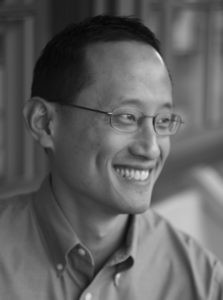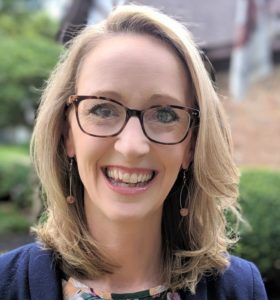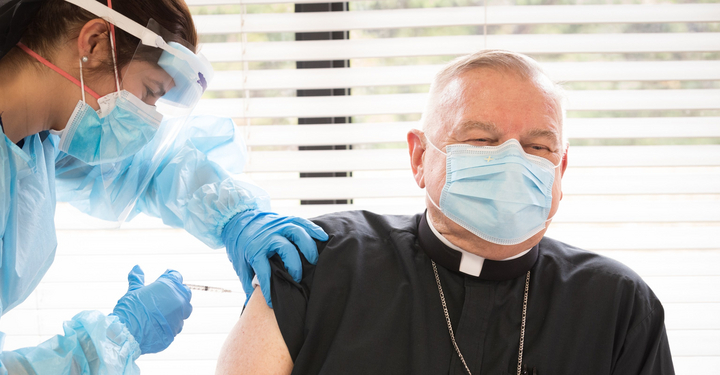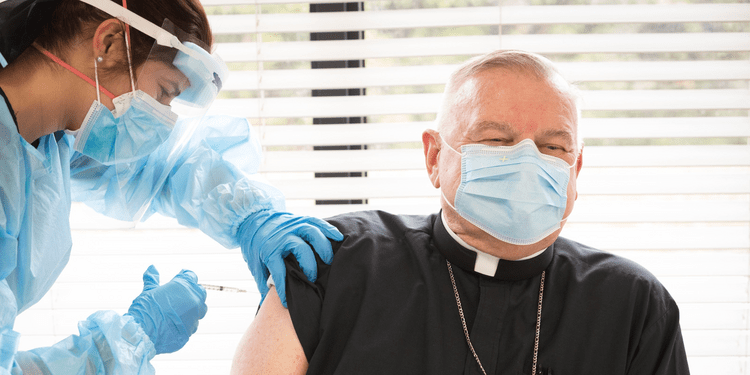It is well-documented by now that white evangelical Christians are among the largest groups resisting vaccination against COVID-19. But the reason for this might not actually be rooted in vaccine denial, according a new analysis in The Atlantic.
“The pattern of resistance to the coronavirus vaccines looks less like COVID-19 vaccine hesitancy and more like COVID-19 denialism,” wrote Robert David Sullivan in the journal. “While a significant chunk of Americans profess to be uneasy about getting shots to prevent COVID-19, most come from the swath of the population that has tended to downplay the disease’s severity and to resist other measures to fight it, rather than the swaths that have resisted vaccines for other diseases.”
Other analysts point to the concurrent effect of white evangelical Christians not trusting the media and other secular institutions.
Both of these theories would explain why evangelical Christians — who typically stake their faith on a literal interpretation of the Bible — don’t see being vaccinated as a way to follow Jesus’ admonition to “love your neighbor as yourself.”
In response to a recent BNG article on new PRRI data that shows 46% of white evangelicals do not see vaccination as a way of loving their neighbors, one BNG reader wrote with an explanation.
“The primary reason I reject the vaccine is due to the general mistrust of the media and government institutions that are pushing vaccination so hard.”
“The primary reason I reject the vaccine is due to the general mistrust of the media and government institutions that are pushing vaccination so hard, even to hinting at the probability the vaccine could become mandatory,” the reader wrote. “If the vaccine is really effective, it will protect those who submit to it. Rejecting the vaccine doesn’t endanger the beloved vaccinated neighbor, provided he doesn’t neglect to get the increasing number of boosters required to ensure its efficacy, But that’s on the neighbor, not the one rejecting the vaccine.”
A tendency exploited
This sentiment resonates with interpretive comments by Curtis Chang, professor at Duke Divinity School and creator of the Christians and the Vaccine project. Chang previously served as pastor of an evangelical church in California.
He recently appeared on the NPR program 1a, on a segment about Christians and the COVID-19 vaccine.

Curtis Chang
“One of the defining cultural marks (of evangelicalism),” he said, “is a tendency to be on guard against secular institutions. It’s a tendency. … What has changed dramatically in the last five to 10 years is that tendency has gotten weaponized into outright distrust of practically every major secular institution. … That has come from external actors seeking to exploit this tendency among evangelicals.”
This has put pastors of evangelical congregations in a tough spot during the pandemic, Chang added. “Pastors are being undermined.”
That mistrust of the vaccine and denial of the severity of the pandemic have been fueled by several sources, but he explained that QAnon and anti-vaxxers are “intentionally targeting the Christian community” with misinformation.
He cited a national survey that found 95% of evangelical pastors said they intend to get the vaccine, compared to 50% of the people in the pews. “That’s a massive gap,” he said.
The mark of the beast?
There’s another segment of the evangelical community that opposes vaccination for more specific reasons: Fear that the vaccine is the dreaded “mark of the beast,” a key to an end-times theology known as premillennial dispensationalism, popular with many but not all evangelicals. It is important to note that not all evangelicals who refuse vaccination do so for fear of receiving the mark of the beast, although some clearly do.
In February, the Washington Post reported on this trend. The story begins: “In an insular world on the social media app TikTok, young Christians act out biblically inspired scenes in which they are forced to take a vaccine for the coronavirus, only to end up splattered in fake blood and on the brink of death.”
Technology reporter Elizabeth Dwoskin, author of the Post story, then explains: “Along with hundreds of thousands of other vaccine-questioning posts by social media users all over the world, they’re demonstrating the ways in which health misinformation is targeting Christians, some reaching sizable audiences.”
Evangelical leaders unheeded
This is happening despite the fact that prominent evangelical leaders including evangelist Franklin Graham and SBC ethics leader Russell Moore have publicly called for Christians to be vaccinated. Graham faced a tremendous backlash from some of his followers.
Evangelist Franklin Graham and SBC ethics leader Russell Moore have publicly called for Christians to be vaccinated.
The Charlotte Observer reported on two public criticisms in particular:
- “STOP. It is NOT your job as a pastor to try and talk people into taking a vaccine that is considered experimental.”
- “I WILL NOT GET THE VACCINE!!! God knew when I was conceived when and how I was to die.”

Emily Smith
Emily Smith, a Baylor University epidemiologist who has been featured several times in BNG articles about the pandemic, told the Washington Post that she is concerned about the apparent acceleration of misinformation and distrust of the vaccine in some Christian circles.
“In the summertime, I thought, these are just fringe beliefs. But the further we got into the pandemic, I realized, these are very widely held, and I was surprised by how many Christians and churches subscribe to this,” she told the Post. Her own Facebook posts under the banner Friendly Neighbor Epidemiologist have sparked harsh responses and even threats.
“It’s one of the scariest and most disheartening parts of this, that so many people think that when you put on a mask, it is the mark of the beast or signals that you don’t have faith or God isn’t in control,” she said.

Joel Rainey
Joel Rainey, lead pastor at Covenant Church, an evangelical congregation in Shepherdstown, W.Va., also appeared on the NPR program 1a along with Chang. He explained how as a pastor he tried to get ahead of his congregation by providing accurate information about the virus and the vaccine and the Scriptures.
Rainey said he was prompted to do so by health care providers in his congregation who convinced him to let them speak along with him. Their argument: “Our folks can hear from people they know and have come to trust.” And that largely appears to have worked, he said.
He predicts that his congregation’s rate of vaccination now mirrors the state of West Virginia, which ranks among the highest in the world.
Young evangelicals
There’s another problem nationally, though, and that is young adults — particularly young evangelicals — who are more likely to be vaccine deniers or vaccine hesitant.
The Atlantic reports again: “Young conservatives are the great outlier. According to Kaiser Family Foundation polling, 13% of Americans say they definitely won’t get a COVID-19 vaccine, but that includes 18% of people ages 30 to 49, and a whopping 29% of Republicans. Hesitancy is particularly high among people who live in rural areas and white evangelicals — for whom increased church attendance correlates with increased hesitancy, according to a survey from the Public Religion Research Institute.”
“Young conservatives are the great outlier.”
The magazine cites research by Civiqs polling that monitors real-time data on vaccine acceptance by age group and other factors. As of April 28, this tracker showed an 18-point gap between 18-to-49-year-olds and those 65 and older on whether they will be vaccinated, not accounting for religious belief.
“People in this age bracket are also less likely to die or get very sick from COVID-19 than others,” The Atlantic noted. “But the gap in skepticism surpasses mere degree and extends into type. No wonder vaccine hesitators are particularly repelled by Anthony Fauci, who has become the public face of efforts to fight the pandemic.”
Why are white Catholics more vaccinated?
And there’s one other oddity about faith and the vaccine that emerged from the latest survey by PRRI and Interfaith Youth Core: White Catholics of all ages are among the most likely of all faith groups to be vaccinated other than Jews. About two-thirds of white U.S. Catholics have received a COVID vaccine or plan to get one.
America magazine, a Catholic publication, reported on the new polling data with an attempt at interpretation but no clear answers: “It is unclear whether the high vaccination rate is a matter of faith — Pope Francis has urged Catholics worldwide to get vaccinated against COVID — or of demographics.”
One possible explanation for the difference is education levels. National polling finds that those with four-year college degrees are more likely than others to say they’ll be vaccinated.
“It is worth noting that, according to a 2016 survey by PRRI, white Catholics are more highly educated than most other religious groups (39% said they were college graduates, compared with 25% of white evangelical Protestants and 12% of Hispanic Catholics),” America reported.
Yet as with others, not all Catholics are motivated by the argument that they should be vaccinated as a way to love their neighbors.
“White Catholics were not especially likely to cite love of neighbor as a reason for getting vaccinated,” the magazine said. “Only 57% of white Catholics agreed with the PRRI statement, not much different than the 55% among Hispanic Catholics or 55% among white mainline Protestants.”
Related articles:
4 in 10 Americans don’t see getting vaccinated as a way to ‘love your neighbor’
Faith leaders are key to reaching herd immunity in U.S., researchers say
Public health officials find churches are ideal sites for COVID vaccine clinics
The church has a role to play in implementing COVID vaccine
6 things you should know about the COVID vaccine
Your friendly neighbor epidemiologist has an important message for you


